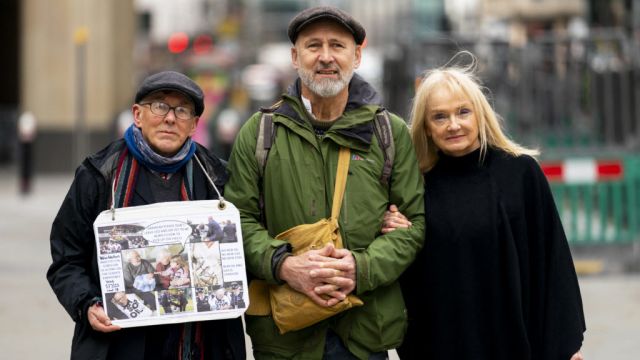Three Just Stop Oil protesters have appeared in court charged with storming the Wimbledon tennis courts with confetti and puzzle pieces.
Deborah Wilde, 69, Simon Milner-Edwards, 67 and William Ward, 66, scaled a barrier and threw the items on the court during The Championships, the world’s oldest tennis tournament, City of London Magistrates’ Court heard on Monday.
The court was told Wilde and Milner-Edwards entered Court 18 at around 2.10pm on July 5th last year, during a match between Bulgaria’s Grigor Dimitrov and Japan’s Sho Shimabukuro.
Bodycam footage played to the court showed them wearing Just Stop Oil t-shirts.

Giving evidence in the trial, Michelle Dite, operations director at the All England Lawn Tennis Club (AELTC), which runs the competition, said Wilde and Milner-Edwards threw “around 1,000” puzzle pieces from a jigsaw that had been purchased at the Wimbledon grounds, as well as confetti.
When she arrived, the scene looked “very unsettling” and the players appeared “very frustrated, probably quite intimidated”, she said.
She added: “There (was) glitter, flutter-fetti – orange – and jigsaw puzzle pieces that have been spread around different parts of the court; either side of the net”.
Wimbledon staff cleared the jigsaw pieces and confetti by hand and using leaf blowers, she added.

The pair was arrested at 2.16pm and around two hours later, Ward, also captured on bodycam footage wearing a Just Stop Oil t-shirt, went onto the same court.
By that time, British player Katie Boulter had started competing against Australia’s Daria Saville.
Miss Dite claimed Ward’s protest was met with louder “boos” from the crowd, many of whom had witnessed the first incident too.

That year AELTC spent “hundreds of thousands of pounds” to manage potential protests after Just Stop Oil demonstrated at the World Snooker Championships and Ashes Test at Lord’s Cricket Ground, she said.
Court 18 is a show court, where many top seeds play in front of “a few hundred” people and there is extensive video coverage, Miss Dite added.
Each defendant denies aggravated trespass for the protest that was said to have taken place on the third day of the two-week tournament.
All three defendants admitted that they entered the tennis courts but said it did not amount to the charge.







